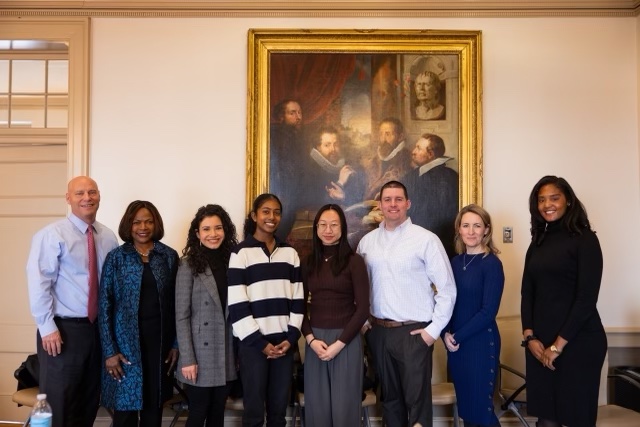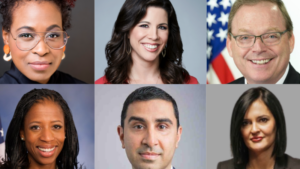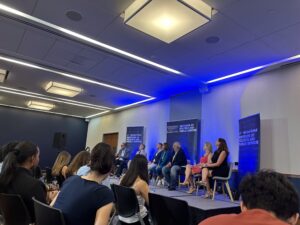Pictured from left to right: Marc Short, Val Demings, Laura Barrón-López, Voice reporters, Dan Lamothe, Machalagh Carr, Deanne Millison.
The Spring 2024 class of GU Politics Fellows sat down with Voice reporters Aaashna and Amber on Jan. 19 to discuss their goals for their discussion groups and the importance of youth perspectives. This semester’s GU Politics line-up included Laura Barrón-López, CNN White House correspondent, Machalagh Carr, former chief of staff to Speaker McCarthy, and Val Demings, former U.S. State Representative (D-FL). Dan Lamothe, Pentagon correspondent, Deanne Millison, former chief economic advisor to Vice President Harris, and Marc Short, former White House legislative director in the Trump administration are also a part of this spring’s cohort.
Aashna: Why did you decide to become a GU Politics fellow? Can you describe how your career journey has led you to becoming a GU Politics Fellow?
Laura Barrón-López: I think that, as a journalist, I always try to talk to a variety of different voices when I’m out on the campaign trail, and a variety of different voters, and I guess I kind of view the experience with students here at GU as an opportunity to also just hear what people of that age and that demographic really are thinking right now about what’s going on in the country.
Dan Lamothe: I was excited to do it. I get a lot of energy from being around students, hearing out their interests, hearing out their questions, sharing more stories with them. And I’ve done a lot of it over the years, visiting journalism classes and that kind of thing, so I see this as kind of an extension of that.
Val Demings: I want to make sure that I’m doing my part to help prepare the next generation of leaders to deal with some of the tough issues that we are facing in this country. When we think about it, if we look historically in America, young people were always at the forefront of every major movement that we have had in this country, and we continue to need you. And so just based on my life experiences and the careers that allowed me to see those things, I think I’m exactly where I’m supposed to be.
Marc Short: I would add that I think our country’s plagued by a lot of partisanship and polarization at the moment. I think that there are ways you can hold on to true convictions philosophically without being disagreeable, and I’m hopeful that this provides that environment. I think something that [GU Politics directors] Mo and Scott and the team have stressed is what they’re hoping that the institute achieves. And I sometimes think that students don’t often get enough perspective from conservatives, so, I’m anxious to share this to them.
Machalagh Carr: I’ve been really lucky. I’ve had some really, really cool jobs, but most of those jobs are jobs that I didn’t know existed when I was in college. And so I think it’s a really important opportunity to look at traditional career paths, like going to law school and being a lawyer, and make sure that people know you don’t have to do any one particular thing with that education, and open up different opportunities. I taught law school for about six years as an adjunct and really enjoyed the interaction with students. And, [I] mean, I’m not a little old lady yet, but it helps keep me kind of in touch with how people are thinking that are not necessarily people that I’m surrounded by every day.
Amber: Can you each briefly talk a little bit about your discussion groups, why you chose your discussion topic?
Dan Lamothe: My group’s called ‘War and Politics.’ It’s focused on how our American conflicts affect our politics and how our politics affect both lenses, right? Like politics affecting our wars and wars affecting our politics. And one thing I see a lot in this city is, especially as our wars have often grown very long in time, they’re often kind of put on the shelf in the back [and we’re] kind of on autopilot to a lot of destructive results. So, having that conversation about whether or not we can and should allow that to happen is important.
Laura Barrón-López: So my conversation is ‘The 2024 Story: Threats to Democracy,’ and it’s about [threats] to the country’s democracy that we’re facing, where those threats are coming from, the normalization of political violence, violent rhetoric and racist rhetoric, and also what the role of the press is in covering that. I hope that we have a really open conversation in the discussion group about what [and how] students think the press should cover that. I can talk about how the press makes our own decisions when we cover this story, and then hopefully also hear from people, like election workers, who can talk about their experience across the country in recent election cycles, when they face threats, and how drastically things have changed for them as they try to carry out the democratic process.
Deanne Millison: My class is called ‘Corporations as Advocates: The Role Corporations Play in Advancing Social Issues,’ and whether they should play a role in public policy and what that means for policy and what that means for the corporation. I chose it because I think it’s a pretty open-ended question. Corporations and folks in the business community are trying their hand at it: some with success, some with not. And I think this generation is going to ultimately determine what role corporations can and should play in our public policy spaces.
Machalagh Carr: My discussion group is ‘What’s the Constitution Got to Do With it? Law and Politics in the Modern Era,’ and the vision is to take snapshots of what is happening in the modern kind of political zeitgeist, what the claim is, and what the Constitution actually says about each of those things. One [discussion] I’m excited about, because of the energy on campus, would be the First Amendment and speech. [I’m] really excited to hear from the students what they view the role of a freedom of expression policy, both as stated by the Constitution and as campus policies exist, for free academic speech on campuses.
Val Demings: My discussion will be on ‘Leadership and Politics: The Good, The Bad and The Ugly.’ We’re going to not only look at some of the current events that have happened like January 6th and what role leadership played in that day. We’re going to talk about this very big discussion on diversity, equity, and inclusion. I think we have to create safe spaces to have some of the toughest discussions if we’re really going to move the needle in the right direction. One of the things I tried to do as a police chief was to create safe environments for officers to be able to talk about racism and not be judged based on what they said in those very safe settings. But I do think if we look historically at some of the most unlikely leaders who helped to make this country the greatest, leadership has always played a major role. I want the students [who’ve] maybe never even thought about being the leaders. Sometimes the best leaders are the ones who are running away from the leadership role right now. But I want them to think about the role leadership plays, and really answer the question, ‘is there a leader in you?’
Marc Short: Through the lens of the 2024 election, I’m anxious to get students’ perspectives [in discussion] about whether or not there’s a more permanent realignment going on between the parties or [if] it’s temporary. I grew up with the position that free trade was orthodoxy to Republicans, and yet today, our nominee is proposing the biggest tariff in American history. I see issues like, despite the Congresswoman’s [Demings’] service as chief of police, I think typically Republicans have been pretty closely aligned with law enforcement. I think that’s changing in this current environment. I look at international affairs and it was always the Republicans in the 70s, 80s, 90s who were looking to fight the communists across the globe, and yet it’s now the Biden administration standing up to Russian aggression in Ukraine, and Republicans are looking to flee from that engagement. So I think there’s a lot of issues that are realigning at this moment and is it temporary around Trump or is it a more permanent realignment happening in the two parties?
Amber: We’re curious about [why you chose] to come to Georgetown and bring these discussions here. Is there anything you’re looking to take away from this experience working with students? Or anything you’re looking to learn from the people that you are now going to be discussing with?
Laura Barrón-López: I just want to learn from students. I just want to hear what students are thinking about what’s going on in the country right now. And, you know, in particular, about threats to democracy. Do they care? What exactly are they worried about or not worried about, right? As they’re looking at what’s going on and preparing to potentially vote in this upcoming election. And I hope that [they] make me think differently about potential stories that I can pursue and potential voices that we should be looking to highlight as we cover this election.
Machalagh Carr: I would say Georgetown is an elite university, and the people who are going to be making the decisions about how to apply constitutional law and theory to everyday American life for the next generation are going to be in this room. And whether or not there should be different amendments, whether or not there should be different interpretations, how these things should be happening, frankly aren’t up to me, right? It’s not up to me, it’s not up to my generation or the generations before. The next batch of Supreme Court Justices might be in the room. The next batch of legal scholars are going to be here. So I would like to kind of help to foment that kind of conversation and discussion with the future leaders of America and the world.
Val Demings: I served three terms in Washington D.C. after working in local government and seeing how different levels of government function. Everybody’s goal, regardless if it’s local, state, federal, should be to get things done for the people that they represent. This is the seat of our government, and the world is watching what America does, whether we like it or not. And so, I think that Georgetown is just the perfect university or place to be. If we really want to get people more engaged, more involved in public service, you’re right here. And the opportunities are right here. That’s incredible.
Deanne Millison: I think for me, I’m excited to see how students kind of engage with brands, and I think it’s going to be different from how people in my generation and other generations engage with brands and what they buy, their purchasing choices, and things like that. And I think it’ll be interesting doing it at Georgetown because it’s a student body that is so engaged with policy. So looking at the intersection of that will be enlightening for me.
Dan Lamothe: I mean, I come at my topic with, you know, kind of as a long term student of military affairs and foreign policy issues, but there’s other pieces to the puzzle and that includes students who are super interested in diplomacy, students who are super interested in, human rights and [I’m] trying to figure out how all these things mesh together, bringing very different groups of people [together] in terms of outlook together to discuss these pretty weighty issues. I’m hoping it, one, it has value and I’m hoping, two, I can learn from it.
Marc Short: I’d say, being in this town long enough creates an unhealthy amount of cynicism and being around idealistic young students can be really refreshing and encouraging. So I feel blessed to have the chance.






